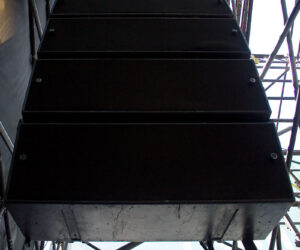At the end of February 2008, Shure had a strong message for its wireless microphone customers in the US.
“The sky is not falling,” said Michael Pettersen, Director of Applications Engineering, whose department talks to hundreds of wireless microphone users every week. “Most people have heard only half of the story, and that half is often wrong.”
A viable case indeed, as Mark Brunner, Senior Director, Public and Industry Relations for Shure explains, “The UHF TV band has been, and will continue to be, the largest and best spectrum for wireless microphone users.”
I’m not going to go into the full details of the statement, as I’m sure it’s been dealt with elsewhere within Live Sound International, however, certain explanations still stand out, and the one the US has to deal with is that the FCC “is considering the use of the ‘White Spaces’ to deliver wireless broadband Internet service to consumer wireless devices.”
Two quick points: consider, if you will, the terms “considering” and “consumer.” We’ll return back to those after an introduction as to what is happening on these very issues in Britain, and then, you may feel that Shure is right on its assertions. In comparison to Britain, the US has no problem.
Governments have to raise money somehow, and here in Britain, we’ve had a great selection of ideas. We had Window Tax (1696-1851) and Radio/TV Licenses (1946-1971), the latter date was when then the radio bit was dropped, but we still pay a TV fee that now runs at around $265 per year per household. That’s just to watch. The BBC gets that cash due to a Royal Charter that guarantees no adverts and editorial independence on that channel. I jest not.
The apocryphal tale here suggests a meeting between our Mr. Blair and your Mr. Bush, where the concept of raising cash by selling off RF was deemed good, probably over the swapping of leather jackets and Earl Grey. Whatever.
The key here, and this is where the British situation differs from that of the US, is that not only did the UK want to make people pay more for something they already had, i.e. buy a new digital-ready TV or set-top box when the old one worked well. But also sell-off huge swathes of RF too, especially those UHF frequencies where TV stations used to sit. Godlike genius. Except for one thing … we were using them as well.
By “we” I refer to what are considered here in Britain as Program Making and Special Events (PMSE). That would be concert production, theater, the local bar musicians, and even (wait for this) broadcast productions themselves, who were all using, and still do use, UHF and even old VHF frequencies.
The problem was, very few were buying licenses.
Yes, the domestic radio license had been dropped, but you had to still buy a license to use some frequencies for PMSE use. Therefore, when the Office of Communication (Ofcom), a very Orwellian-termed organization and the independent regulator and competition authority for the UK communications industries, approached the Joint Frequency Management Group (JFMG) who was given the task of selling such licenses, the figures were derisory in real terms. And that, my friend, is how the fight started.
Whether the FCC and the US government have realized the consequences of the digital switchover (DSO) on local PMSE is a matter of question. Certainly, here in Britain it took many years of hard discussion, and even now, although the PMSE sector has received recognition, the picture is worse than it was pre-DSO.
And yes, you read that right: as sections of the UK are now switched off as far as analog TV delivery is concerned. Parts of Wales went ages ago, and Whitehaven in the north switched off between October 17 and November 14 last year. It’s a wave that will continue for several years to come on a regional basis. The good news is that here in Britain, the final DSO phase does not happen until 2012, when strangely we host the Olympics in London, the last region to switchover.















